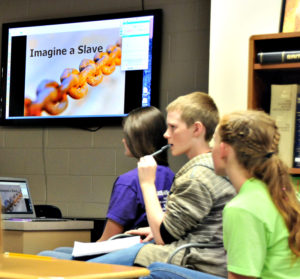By Lindsay Steele
The Catholic Messenger
DeWitt — During a webinar last month, human trafficking expert Anna Clarke asked junior high students at St. Joseph Catholic School in DeWitt to imagine a slave. “When did they live?” she asked.

St. Joseph Catholic School students Crystal Burke, Joe Stammeyer and Erin Stammeyer watch a webinar on human trafficking April 30 in the school library.
Almost unanimously, the group of students said they pictured someone from the 1700s or 1800s. Their eyes widened when the facilitator explained that about 27 million slaves exist today.
“The truth is, even though it is outlawed in every country, there are documented cases of it happening everywhere,” explained Clarke, anti-trafficking program coordinator from the Intercommunity Peace and Justice Center in Seattle. “Slaves today are forced to do all kinds of different work.”
The seventh- and eighth-grade students received a lesson on modern-day slavery through the interactive webinar. Watching the visual part of the presentation on a computer projection screen, they were able to communicate with the facilitator and provide feedback throughout the presentation.
School principal Sharon Roling said she heard about the webinar from Lori Freudenberg, co-chair of the Sisters of St. Francis Human Trafficking Committee in Clinton. Iowa CORE curriculum requirements ask schools to connect students with the global community through interactive technology. Roling said she felt the webinar would be a great way to fulfill that requirement while educating students about a human rights issue that is important to Catholics. “It’s the best of both worlds,” she explained to The Catholic Messenger.
Clarke explained to the students that human trafficking goes against the Catholic call for human dignity and breaks the commandment that outlaws stealing.
During the presentation, students learned the definition of human trafficking. Clarke said, “It’s moving a person away from their home and using force or deception to put them in a position of exploitation.” Persons may be forced to work in farms, factories, nail salons or as nannies or prostitutes.
A large part of the presentation focused on persons forced to work in mines in Africa. Clarke said the demand for materials such as tin, tantalum and tungsten are high because of their use in computers, cell phones and other electronics. They are referred to as “conflict minerals” for this reason. She said manufacturers may not be aware that they are using conflict minerals in their products, since there are so many steps between initial mining of these materials and assembly of the technology devices.
Clarke told the students that they could make a difference in reducing demand for products that use slave labor by looking for fair trade labels when available. She said the label isn’t available for “a lot of things and is not available for electronics. That can be depressing,” but some companies are beginning the process of looking into the source of their materials and attempting to make changes. Intel, for example, utilizes “conflict-free” microprocessors and their products will be completely conflict free by 2016. She said a letter inspired Intel to make the change. The students can try to encourage other companies to become conflict free by writing letters.
The students were surprised and saddened to hear about the prevalence of modern-day slavery. “A thought that kept running through my mind was ‘no way,’” said eighth-grader Hope Petersen. “I couldn’t believe that people would — and could — be that cruel and neglectful of the most basic of human rights.”
Students were also upset to hear how modern-day slaves are involved in the production of common items. Eighth-grader Justin Costello said, “The webinar made me think about how we take advantage of material things that slaves have to make for little to no pay. I want to help these people by only buying Fair Trade products.”
Madison Kizer, an eighth-grader, said she felt motivated to try and make a difference. “This experience has made me want to get more involved in what goes on in our world and how we should be the ones to take action and stop slavery.”
The teachers, too, were affected by the webinar. “It was a real eye-opener,” said math and religion teacher Lola Blaser. “I think I’ll think twice about the technology I buy now.”











